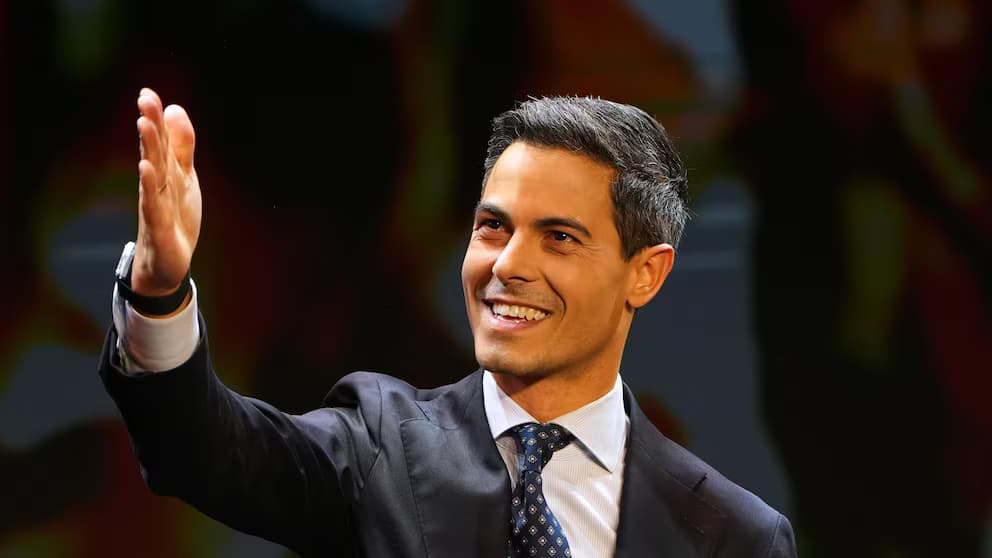We're loading the full news article for you. This includes the article content, images, author information, and related articles.
A dramatic surge for the centrist D66 party, led by Rob Jetten, creates a dead heat with the far-right, signaling a potential policy shift in a key Kenyan trade and development partner.

THE HAGUE, NETHERLANDS – In a stunning political upheaval, the Netherlands is on course for its youngest-ever prime minister, Rob Jetten, after his socially liberal D66 party achieved a historic surge in the general election on Wednesday, 29 October 2025, East Africa Time. With nearly all votes counted by Thursday morning, 30 October 2025, Jetten’s D66 was in a virtual tie with the far-right Party for Freedom (PVV), led by anti-Islam populist Geert Wilders.
The result has thrown Dutch politics into a period of intense uncertainty, with both parties projected to secure 26 seats each in the 150-seat House of Representatives. This unprecedented neck-and-neck finish marks a dramatic reversal of fortune from the 2023 election. Jetten’s D66 gained 17 seats from the nine it previously held, while Wilders' PVV, which was the largest party in the previous coalition, lost 11 seats. The election was triggered in June 2025 when Wilders withdrew his party's support from the ruling coalition over a dispute on asylum policy, causing the government of Prime Minister Dick Schoof to collapse after just 11 months.
The outcome of the ensuing coalition negotiations in The Hague will be closely watched in Nairobi. The Netherlands is a critical economic partner for Kenya, ranking as its second-largest export destination in Europe, with bilateral trade exceeding KSh 75 billion in 2023, as confirmed during a Dutch royal visit in March 2025. The two nations share deep ties in agriculture, particularly horticulture and floriculture, as well as in climate action and security cooperation.
A government led by Rob Jetten and his pro-European, climate-focused D66 party would likely signal policy continuity and potential strengthening of these ties. Jetten, born 25 March 1987, has a political career centered on climate and energy policy, democratic renewal, and strong European cooperation. His party’s platform emphasizes investment in a green economy, sustainable agriculture, and international cooperation to meet climate goals—policies that align closely with existing Kenya-Netherlands initiatives, such as the Cool Logistics Corridor project designed to streamline horticultural exports. In a statement on 29 October 2025, Jetten also affirmed his strong support for Ukraine, signaling a commitment to international alliances.
Conversely, a significant role for Geert Wilders’ PVV could have presented a starkly different future. The PVV platform is staunchly nationalist, anti-immigration, and Eurosceptic. Wilders has advocated for banning the Quran, closing mosques, and ending immigration from Muslim countries. His party’s agenda also calls for halting funding for international development and climate change initiatives, positions that could directly impact Dutch aid and investment programs in Kenya. However, with all major mainstream parties having ruled out forming a coalition with Wilders, his path to power appears blocked, positioning Jetten as the most likely candidate to lead the complex formation talks.
Rob Jetten, 38, began his career as a policy advisor and chairman of the Young Democrats before being elected to parliament in 2017. He became the leader of D66 in August 2023. His campaign resonated with voters through an optimistic message, contrasting sharply with what he termed Wilders' politics of "negativity and endless hatred." D66's manifesto, titled "Het kan wel" ("Yes, it can"), focused on tackling the country's acute housing shortage, reforming the social benefits system, and strengthening democratic institutions.
Geert Wilders, 62, has been a polarizing figure in Dutch politics for nearly two decades since founding the PVV in 2006. His political career has been defined by his opposition to what he calls the "Islamisation of the Netherlands." Despite his party's significant losses, Wilders insisted early Thursday that his party should have a role in coalition talks, a prospect other leaders have firmly rejected.
The process of forming a new government is expected to be lengthy and arduous, potentially taking months. Jetten has expressed a preference for a coalition built from the “broad political center.” Given the fragmented political landscape, a stable government will likely require an alliance of at least four parties. The final, official election results are expected to be announced next week.
Keep the conversation in one place—threads here stay linked to the story and in the forums.
Sign in to start a discussion
Start a conversation about this story and keep it linked here.
Other hot threads
E-sports and Gaming Community in Kenya
Active 9 months ago
The Role of Technology in Modern Agriculture (AgriTech)
Active 9 months ago
Popular Recreational Activities Across Counties
Active 9 months ago
Investing in Youth Sports Development Programs
Active 9 months ago